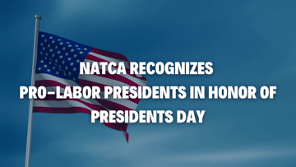
NATCA Recognizes Pro-Labor Presidents in Honor of Presidents Day
Presidents Day, officially called Washington’s Birthday, is a U.S. federal holiday celebrated on the third Monday of February in honor of George Washington, the first president of the United States.
Increasingly, the holiday has become an occasion to recognize the achievements of U.S. presidents throughout our nation’s history. Today, NATCA recognizes several presidents who helped pave the way for the success of American labor unions, especially for federal employees. From President Franklin D. Roosevelt’s Wagner Act to John F. Kennedy’s Executive Order 10988 and President Jimmy Carter’s Civil Service Reform Act of 1978, today we recognize the administrations of our national leaders who helped advance the rights of federal workers to organize and collectively bargain.
President Franklin D. Roosevelt took office on March 4, 1933. Although the future of labor unions looked grim then, their fortunes soon changed as they experienced tremendous gains from the pro-union stance of the Roosevelt administration and from legislation enacted by Congress during the early New Deal. The National Industrial Recovery Act (1933) provided for collective bargaining. The 1935 National Labor Relations Act (also known as the Wagner Act) required businesses to bargain in good faith with any union supported by the majority of their employees.
The Wagner Act established: “Employees shall have the right to organize and bargain collectively through representatives of their own choosing, and shall be free from the interference, restraint, or coercion of employers.”
Roosevelt also was the first president to name a woman to his cabinet: Frances Perkins was named Secretary of Labor in 1933. Learn more about Roosevelt and the New Deal’s support for employees’ right to collective bargaining here.
Last month marked the 60th anniversary of John F. Kennedy’s Executive Order 10988 granting federal employees stronger workplace rights and recognizing the value that an empowered workforce brings to public service. Kennedy was, until his assassination, an advocate for fair and safe conditions for American workers.
This executive order was considered the most significant victory in that era for federal employees, allowing the American Federation of Government Employees (AFGE) to come together as one to secure a better future for workers and their families. As pay and working conditions improved, more employees felt empowered and joined AFGE, growing its membership by 159% in the ensuing decade. Read more about Kennedy’s support for labor here.
When President Jimmy Carter took office in 1977, legislation permitting federal employees to organize was badly in need of reform.
Carter signed the Civil Service Reform Act of 1978 (including the Federal Labor Relations Act, also known as the Federal Service Labor-Management Relations Statute). This statute remains the basis for unions and collective bargaining in the federal sector. It also established the Federal Labor Relations Authority to promote stable, constructive labor relations to contribute to a more effective and efficient government. The Carter administration also actively assisted labor and management groups interested in developing cooperative or tripartite approaches to non-“bread-and-butter” union issues, such as investment in new plant and equipment, environmental regulations, impact of deregulation, job safety and health, and absenteeism. Learn more about Carter and his administration’s labor-related efforts here.

